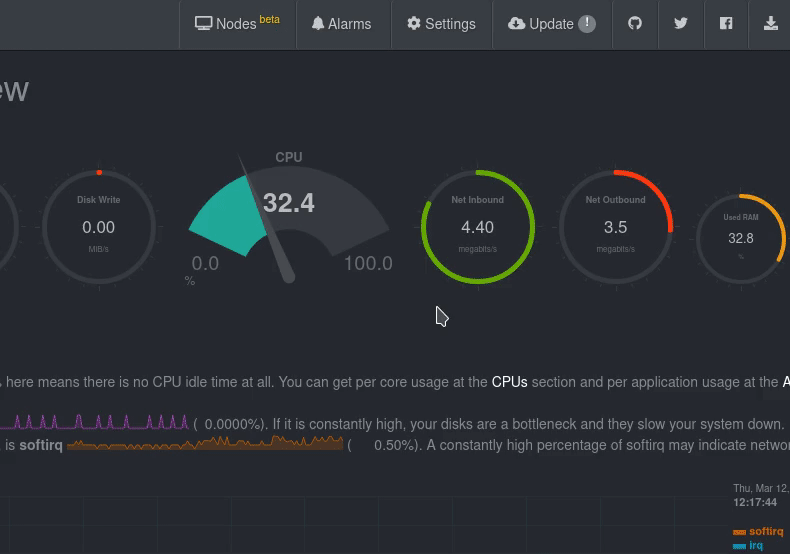We actively develop Netdata to add new features and remove bugs, and encourage all users to ensure they're using the most up-to-date version, whether that's nightly or major releases.
Before you update Netdata using one of the methods below, check to see if your Netdata agent is already up-to-date by opening the update modal in the dashboard. Click the Update button in the top navigation to open it. The modal tells you whether your agent is up-to-date or not.
If your agent can be updated, use one of the methods below. The method you chose for updating Netdata depends on how you installed it. Choose from the following list to see the appropriate update instructions for your system.
- One-line installer script (
kickstart.sh) .debor.rpmpackages- Pre-built static binary for 64-bit systems
(
kickstart-static64.sh) - Docker
- macOS
- Manual installation from Git
If you installed Netdata using our one-line automatic installation script, run it again to update Netdata. Any custom
settings present in your Netdata configuration directory (typically at /etc/netdata) persists during this process.
This script downloads the latest Netdata source (either the nightly or stable version), compiles Netdata, and updates it via reinstallation.
bash <(curl -Ss https://my-netdata.io/kickstart.sh)
⚠️ If you installed Netdata with any optional parameters, such as--no-updatesto disable automatic updates, and want to retain those settings, you need to set them again during this process. See thekickstart.shdocumentation for more information on these parameters and what they do.
If you installed Netdata with .deb or .rpm packages, use your distribution's package manager update Netdata. Any
custom settings present in your Netdata configuration directory (typically at /etc/netdata) persists during this
process.
Your package manager grabs a new package from our hosted repository, updates Netdata, and restarts it.
apt-get install netdata # Ubuntu/Debian
dnf install netdata # Fedora/RHEL
yum install netdata # CentOS
zypper in netdata # openSUSEYou may need to escalate privileges using
sudo.
If you installed Netdata using the pre-built static binary, run the kickstart-static64.sh script again to update
Netdata. Any custom settings present in your Netdata configuration directory (typically at /etc/netdata) persists
during this process.
This script downloads the latest Netdata source (either the nightly or stable version), compiles Netdata, and updates it via reinstallation.
bash <(curl -Ss https://my-netdata.io/kickstart-static64.sh)
⚠️ If you installed Netdata with any optional parameters, such as--no-updatesto disable automatic updates, and want to retain those settings, you need to set them again during this process. See thekickstart-static64.shdocumentation for more information on these parameters and what they do.
Docker-based installations do not update automatically. To update an agent running in a Docker container, you must pull the latest image from Docker hub, stop and remove the container, and re-create it using the latest image.
First, pull the latest version of the image.
docker pull netdata/netdata:latestNext, to stop and remove any containers using the netdata/netdata image. Replace netdata if you changed
it from the default in our Docker installation instructions.
docker stop netdata
docker rm netdataYou can now re-create your Netdata container using the docker command or a docker-compose.yml file. See our Docker
installation instructions for details. For example, using the
docker command:
docker run -d --name=netdata \
-p 19999:19999 \
-v /etc/passwd:/host/etc/passwd:ro \
-v /etc/group:/host/etc/group:ro \
-v /proc:/host/proc:ro \
-v /sys:/host/sys:ro \
-v /etc/os-release:/host/etc/os-release:ro \
--cap-add SYS_PTRACE \
--security-opt apparmor=unconfined \
netdata/netdataIf you installed Netdata on your macOS system using Homebrew, you can explictly request an update:
brew upgrade netdataHomebrew downloads the latest Netdata via the formulae, ensures all dependencies are met, and updates Netdata via reinstallation.
If you installed Netdata manually from Git using netdata-installer.sh, you can run that installer again to update your
agent. First, run our automatic requirements installer, which works on many Linux distributions, to ensure your system
has the dependencies necessary for new features.
bash <(curl -sSL https://raw.githubusercontent.com/netdata/netdata/master/packaging/installer/install-required-packages.sh)Then, navigate to the directory where you first cloned the Netdata repository, pull the latest source code, and run
netdata-install.sh again. This process compiles Netdata with the latest source code and updates it via reinstallation.
cd /path/to/netdata/git
git pull origin master
sudo ./netdata-installer.sh
⚠️ If you installed Netdata with any optional parameters, such as--no-updatesto disable automatic updates, and want to retain those settings, you need to set them again during this process.
